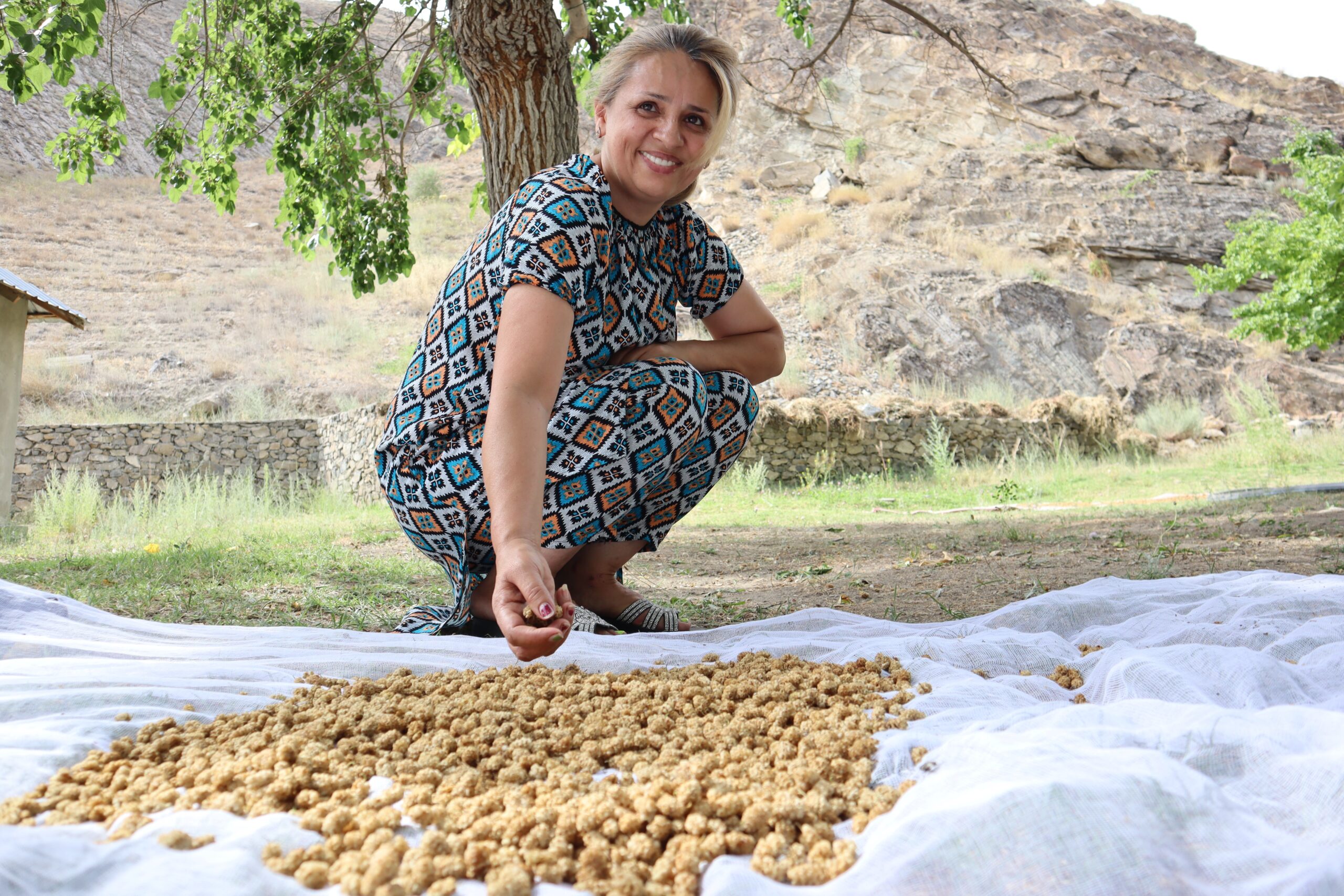
In the scenic Badakhshon province of Tajikistan, a transformative shift is underway, reshaping the lives of local farmers, boosting businesses, and uplifting the agricultural market. By connecting mulberry farmers with processing companies, transport networks, and international markets, the USAID-funded Market Driven Rural Development Activity (MDRD) has empowered every link in this value chain and has triggered a systems change in the mulberry sector.
A Hidden Gem
Badakhshon, a remote rocky region in the east of Tajikistan, is home to around 230,000 people. This mountainous province, sharing a border with Afghanistan and serving as a key trade corridor to China, is renowned for its stunning landscapes—but also for its harsh climate, limited arable land, and poor infrastructure. These challenges have often driven local populations to migrate out in search of better opportunities.
One of the rare crops thriving in the mountains is the mulberry fruit, though, for years, it was an underutilized resource. While it grew abundantly in the region, its economic potential was overlooked due to the absence of a robust market. Without proper infrastructure or a steady demand, many households would use the mulberries improperly instead of selling the fruit. This practice not only limited income opportunities but also failed to unlock the crop’s full value.
“Before, we didn’t see the point of selling them,” recalls Khushbakht, a farmer from Rushon. “The market was weak, so we fed the mulberries to our animals or let them go to waste. We never imagined they could be a source of real income.”
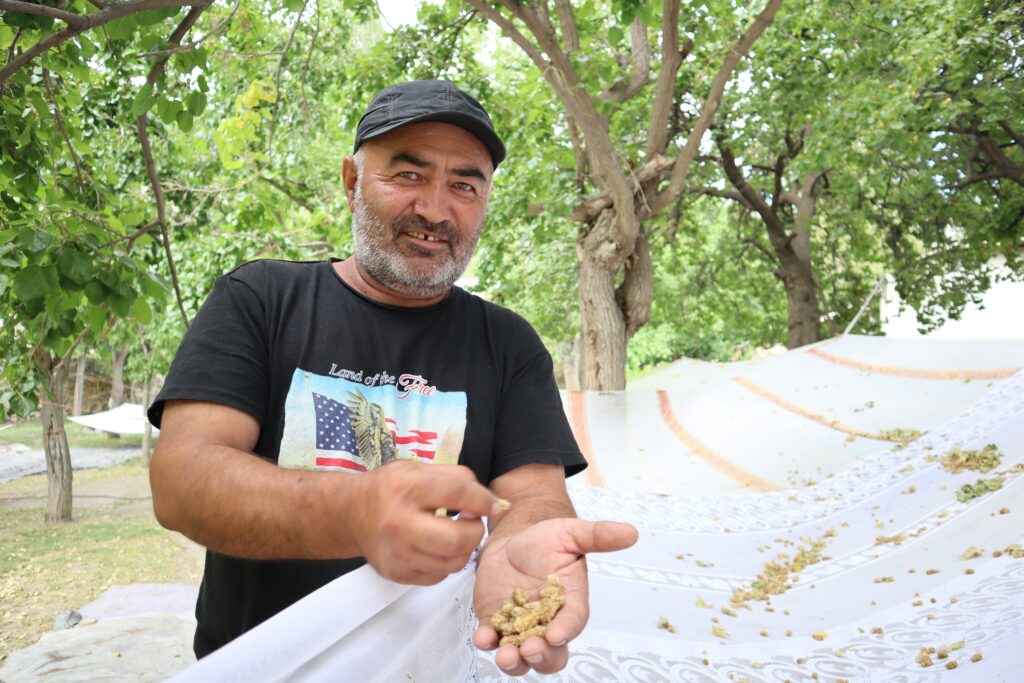
Limited infrastructure, outdated processing facilities, and a lack of access to broader markets meant that much of the mulberry yield went unprocessed or was sold at low prices. With no organized system to connect farmers to buyers, local producers struggled to secure consistent income. These issues created a cycle of stagnation, limiting the crop’s economic impact and the region’s development.
While many of these challenges are deep-seated and will take time to resolve, MDRD’s partnerships with some of the local market actors in the regions are starting to unlock some of them and helping revive the interest in this fruit. For example, at a recent meeting with MDRD, Ishkoshim district chairman Anvar Imatshozoda proposed to plant mulberry trees all along the road by the Amu River.
Furthermore, since a majority of those involved in the households with mulberry are women, growth in the sector directly contributes to increased agency and income as well. As global demand for high-quality, niche agricultural products rises, Badakhshon’s mulberries are set to capitalize on this shift.
Market Transformation Step I: Premium Equipment
To support this vision of growth and inclusion, MDRD improved the capacity of two key companies involved in mulberry processing and export: Nasim in Khorugh city and Tuti Pomir in Shughnon district. These companies received brand-new machinery—including package printing, drying chamber, cutting, and other machines designed to increase both production efficiency and product quality.
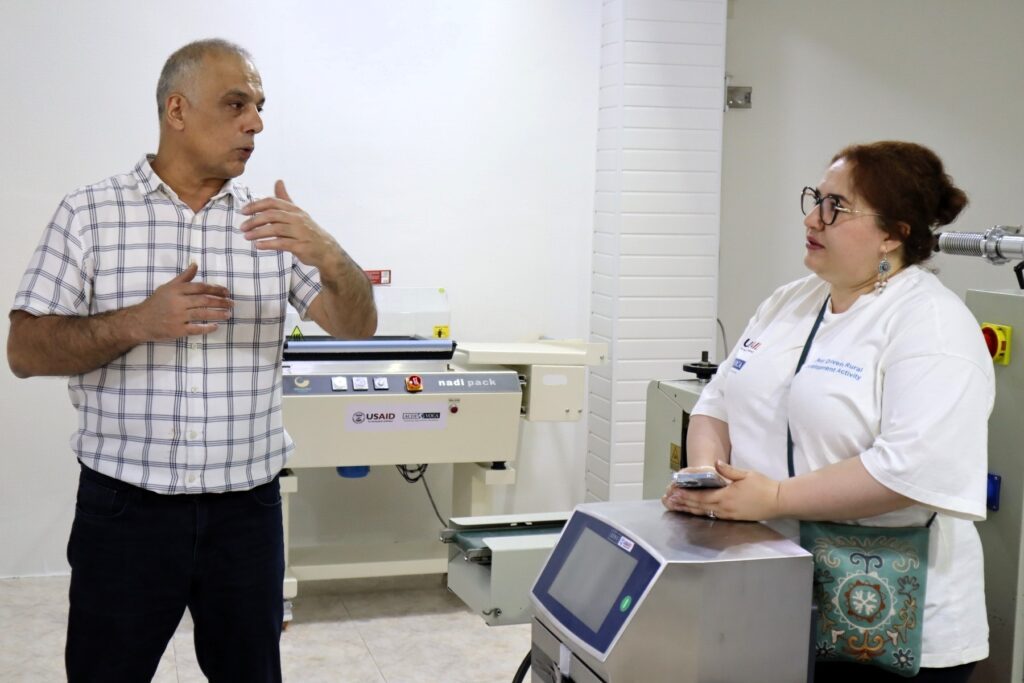
Prior to this, both companies were struggling with outdated equipment, limiting their ability to meet rising demand. Only a quarter of around 100 tons of annual yield are now being processed, roughly calculated by local experts. The total value of the equipment provided is estimated at USD 120,000, an investment that would have been out of reach without external support.
“These machines have completely changed our operations,” says Davlatali Marodaliev, owner of Tuti Pomir. “Before, we could only process a small amount and the quality wasn’t consistent. Now, we can produce more, faster, and at a much higher standard.”
He says the new equipment has increased production by 60-70 percent.
Market Transformation Step II: Connecting Farms and Firms
A keystone of this work was to forge strong ties between mulberry processing companies and local farmers, ensuring a steady supply of high-quality fruit. In addition to distributing over 400 farmers with specialized mulberry collection nets with funds from MDRD, both companies coached farmers on mulberry care, pruning, fertilization, and pest management.
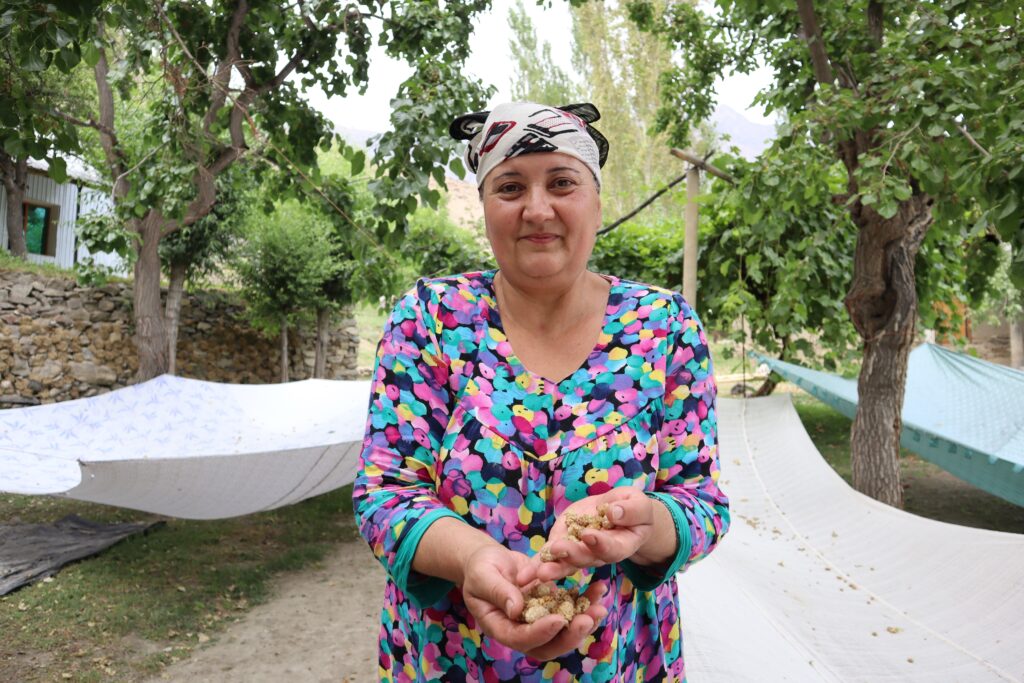
“The nets have made a huge difference,” says Zarina, a female farmer from Rushon. “Before, our mulberries would get damaged, and we couldn’t sell them at a good price. Now, the fruit stays perfect, and I can sell more.”
Over 1,000 women farmers have already benefited from increased income. Most of the mulberry sales happen right before school starts, which is timely for the farmers’ families.
Mijgona, who also teaches English at a local school, adds: “The money we earn from selling mulberries helps us buy school uniforms, winter clothes, and essential supplies, such as pens and notebooks, for our kids.”
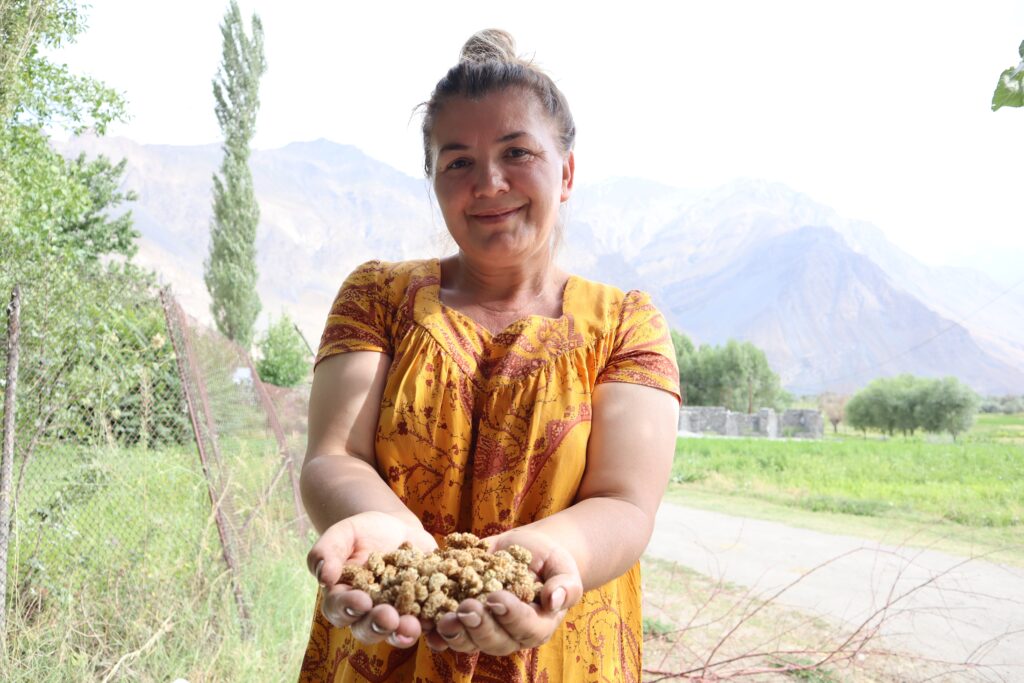
This extra income is making a real difference for families, giving them more opportunities and a brighter future.
Higher prices built on improved quality of mulberries and increased demand from the processors and aggregators add motivation. This financial boost has not only increased farmer income but has also laid the groundwork for a more sustainable, long-term partnership between the processing companies and the farming community, excluding mediators from the chain. By offering higher prices—from USD 1,1 – 1,3 per kilogram to $1,8-1,9 just a season after—the companies created an incentive for farmers to invest more land and effort into mulberry cultivation.
As an added part of this initiative, Tuti Pomir and Nasim supplied farmers with 450 mulberry saplings with more to come, encouraging them to expand their orchards. These new trees help prevent erosion and enhance climate resilience. Mr. Marodaliev recognizing that the idea comes from MDRD says he will continue supplying trees and make this a continuous tradition, especially in the light of many trees being old and many others cut during harsh winters.
Market Transformation Step III: Roads, seeds and money
By connecting dried fruits processors with local transport companies, we’ve built a smoother distribution chain, ensuring that high-quality mulberries reach both domestic and international markets. This collaboration has already led to impressive results, with Tuti Pomir exporting to Europe this autumn.
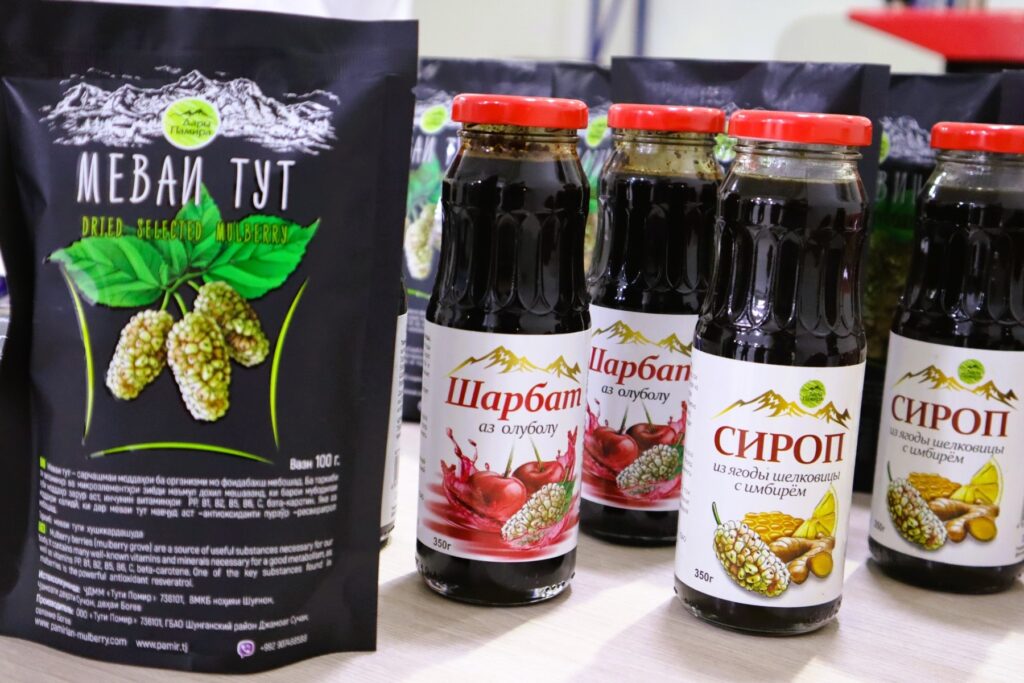
To help local businesses expand, MDRD plans to work with transport companies to increase their capacity. With the intended addition of refrigerated trucks, businesses could transport perishable goods faster and more efficiently, ensuring that Tajikistan’s mulberries meet the high standards required for international export.
“The roads here are difficult, and it can take days to transport goods to the city,” says Shuhrat Qodirov, a local transport business owner. “The refrigerated trucks will make a huge difference, especially for goods like mulberries.”
In addition to strengthening logistics, we actively work with local banks to provide farmers and businesses with better loan options and financial services, making it easier for them to invest in their mulberry production and related business activities. We have supported a local microloan provider Rushdi Kuhiston to scale up to the entire region and open branches in Rushon, Roshtqala, Vanj, and Murghob, all in Badakhshon.
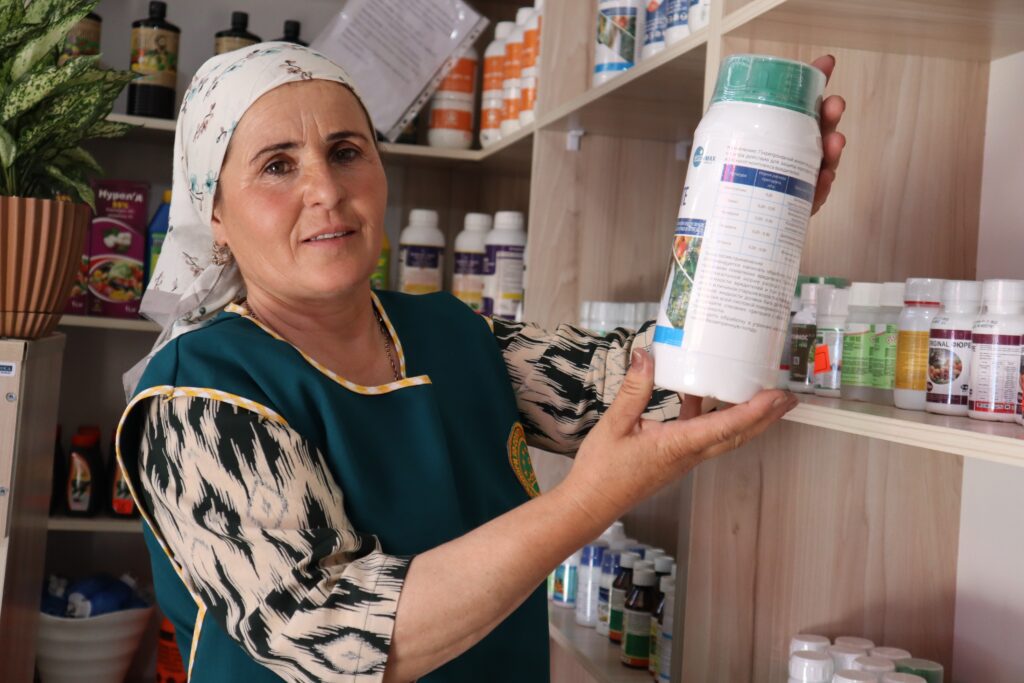
Looking wider at the bigger picture, MDRD is also collaborating with input companies to ensure a consistent supply of essential resources like mulberry saplings, fertilizers, and equipment. We supported a local seller to open two new agri-shops in Khorugh and Rushon, as well as helped set up a nursery in Ishkoshim to promote a supply of increased quality fruit tree saplings, including mulberries. This added support empowers farmers to maintain healthy orchards and increase productivity over time.
Backing from the Top
MDRD’s work has garnered significant recognition from local top government officials who have praised the program’s impact on the community and regional economy. Just three months ago, in September 2024, the Nasim factory in Khorugh, now equipped with modern machinery—including equipment provided by USAID through MDRD—was inaugurated by the President of Tajikistan.
“The work in the agricultural sector of the region is key in increasing local incomes and reducing poverty,” says Sharifkhon Safarzoda, First Deputy Governor of the Badakhshon, acknowledging the ongoing contributions of MDRD to local agribusinesses and conveying his enthusiasm for the prospects that this collaboration could bring to the province. “It will create jobs and opportunities for our community.”
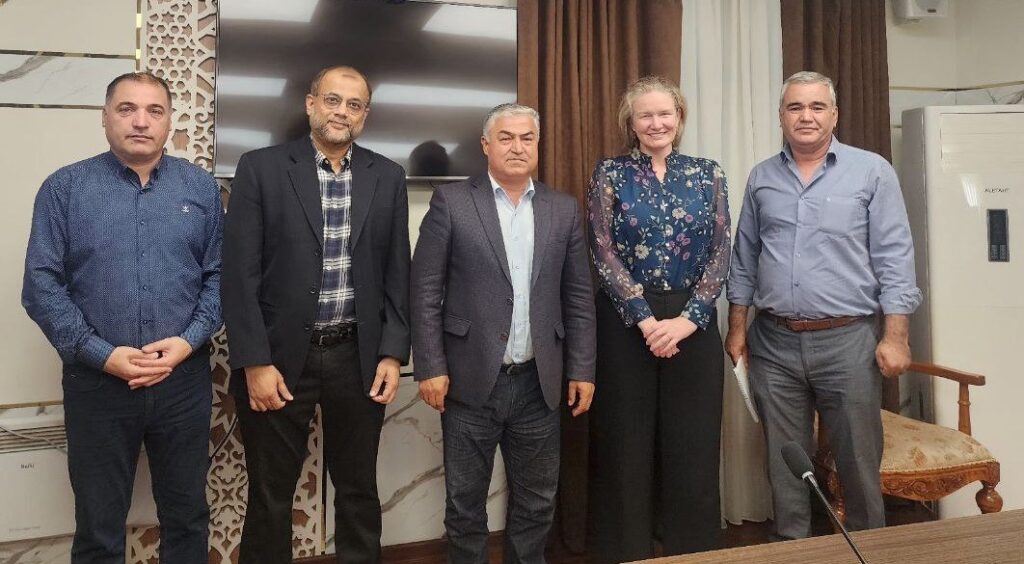
Tapping Global Markets: Sweet Success
Our partner companies are now ready for international clientele and are looking for opportunities at international fairs, like in Almaty, making their products more appealing to international buyers. These joint efforts have already led to improved product quality and packaging, and new markets.
“We have just sent about ten tons of dried mulberry and mulberry bars to Poland and Lithuania,” shares Davlatali Marodaliev, owner of Tuti Pomir. “This is just the beginning. With better equipment and logistics, we can scale up and meet even more international demand.”
MDRD will soon be taking a closer look at the results of this initiative to better measure its impact and the key role it played in making these changes happen. A detailed document will be ready shortly and will highlight the success and lessons learned from the program.
Learn more about the Market Driven Rural Development Activity.
Learn more about our work in Tajikistan.





